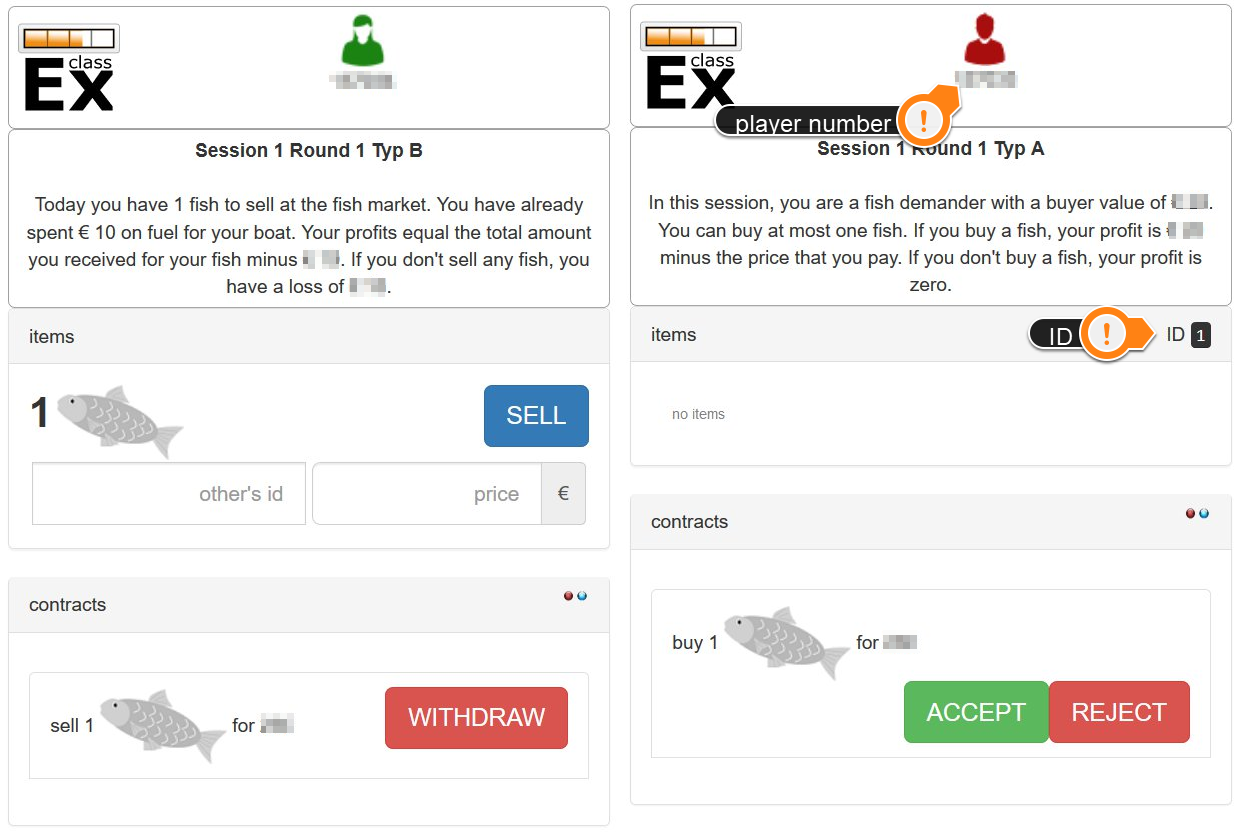Version 1.01, October 2019
It is early morning at the fish market on a lonely Pacific island. The mist is rising, the gulls are calling, and the fishermen have just returned to the harbor with their catch. A noisy crowd of villagers have come to the fish market to gossip and buy their dinners.
There are no refrigerators on the island and day-old fish will spoil. One fish is enough to feed a family for a day, so each demander wants at most one fish. Demanders value the fish according to their Buyer Value. The overall distribution of Buyer Values will be the same in both sessions, though individual Buyer Values may change from one round to another.
The number of fish that a fisherman catches may vary from round to round. Sometimes a fisherman may catch only one fish, sometimes two or three fish. Last night, before going out to sea, every fisherman had to pay 10€ to fuel his fishing boat. This money has already been spent, and so every fisherman has costs of 10€ regardless of how many fish he sells. Once a fish is caught, no other expenses are incurred in selling it. Fishermen cannot save any costs by not selling their fish.
Because of changes in the weather, fishermen will catch more fish in the second Session than in the first.

In this experiment, you will be either a fisherman with fish to sell or a fish demander (see Figure 1).
Your objective is to make as much profit as possible. Profit will be measured in “laboratory currency units”, though we will denote the units with the s€ign.
If you are a fish demander and you buy a fish, your profit is the difference between your Buyer Value and the price you paid for the fish.
If you are a fisherman, you will have either one, two, or three fish to sell. If you have more than one fish, you must find a different buyer for each fish that you sell. After you have submitted a contract for the sale of a fish, if you still have some fish left, you can return to the market and look for another buyer. Your profits are equal to the total amount of money you get from selling your fish minus the 10€ fuel cost. If you sell no fish at all, you will have a loss of 10€.
Sellers and buyers must find each other and agree on a price. If they reach an agreement, the seller should fill up the offer in her screen with the price and the buyer ID and click on the "SELL" button. The buyer must accept the offer to finalize the contract. The sales contract is then displayed as accepted in the contract section.
Click here if you need information on how to trade in classEx .
After reading the instructions for this experiment, please check your understanding by answering the following questions and recording what you expect to happen. Answers to the warm-up exercises can be found at the end of the document here.
In the first Session of this experiment, suppose that you catch two fish. You sell one fish for 15€ and one fish for 6€. How much is your total profit? Suppose that you sell the first fish for 15€ and are unable to sell the second fish. How much is your total profit?
Suppose that you have caught only one fish. The best offer that you are made for this fish is 4€. What would be your profit (or loss) if you sell the fish for 4€? What would be your profit (or loss) if you don’t sell your fish, but let it rot? If you want to maximize your profit from this experiment, and you are faced with a choice between selling the fish for 4€ or not selling the fish, what should you do?
Suppose that you are a fish demander with a Buyer Value of 20€, and you see that there are many fishermen still trying to sell fish, but only a few demanders left who have not already bought their fish. Assuming that you want to maximize your profits, at what price would you offer to buy?
Suppose that you are a fisherman and you have one fish left to sell. You see that almost all of the fish demanders have already bought their fish, but there are several fishermen still trying to sell fish. The average price of the fish that have already been sold is about 10€. Would you expect to be able to sell your fish for 10€? If somebody offered you 2€ for your fish, would you take the offer? Explain.
Before participating in an experiment, it is useful to think about what you expect to happen and to to record your prediction. After the experiment, look back at your notes and compare your expectations with what actually happened. If you are surprised by the result, reflect on your priors and the theory and see if you can make sense of your new experience.
If fishing conditions improve so that more fish are caught, would you expect the price of fish to go up or down? Would you expect total profits of all fishermen to go up, go down, or stay the same?
Answers to Warm-up Exercises
(1) 21€\(-\)10€\(=\)11€, 5€; (2) 4€\(-\)10€\(=-\)6€, \(-\)10€, sell the fish; (3) Low offers could work; (4) No, there are many more fish available than buyers will buy. Every fisherman would rather sell for a positive price than give his fish away. Smart buyers will be able to get fish cheaply. The low price may be something to consider.